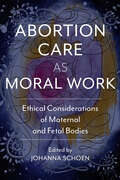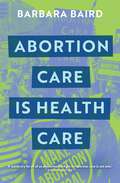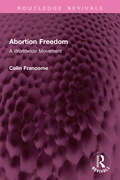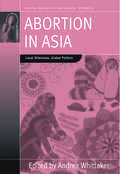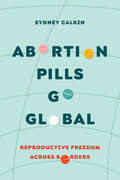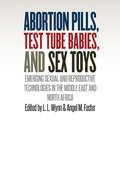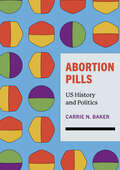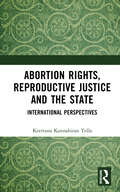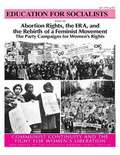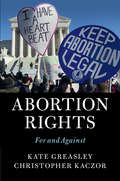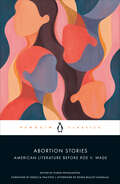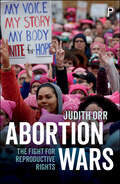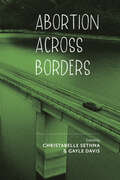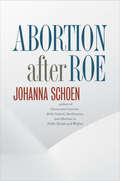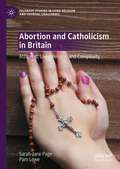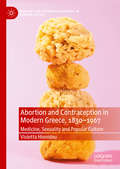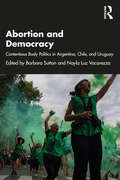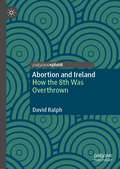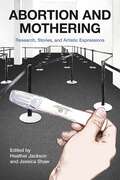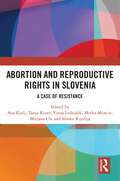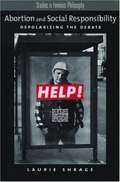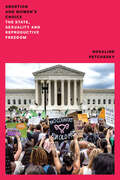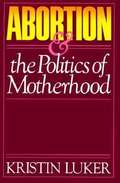- Table View
- List View
Abortion Care as Moral Work: Ethical Considerations of Maternal and Fetal Bodies (Critical Issues in Health and Medicine)
by Shannon Withycombe Colin Partridge Curtis Boyd Glenna Boyd Renee Chelian Thomas Cunningham Sarah Dubow Marc Heller Amy Hagstrom Miller Shelley SellaAbortion Care as Moral Work brings together the voices of abortion providers, abortion counselors, clinic owners, neonatologists, bioethicists, and historians to discuss how and why providing abortion care is moral work. The collection offers voices not usually heard as clinicians talk about their work and their thoughts about life and death. In four subsections--Providers, Clinics, Conscience, and The Fetus--the contributions in this anthology explore the historical context and present-day challenges to the delivery of abortion care. Contributing authors address the motivations that lead abortion providers to offer abortion care, discuss the ways in which anti-abortion regulations have made it increasingly difficult to offer feminist-inspired services, and ponder the status of the fetus and the ethical frameworks supporting abortion care and fetal research. Together these essays provide a feminist moral foundation to reassert that abortion care is moral work.
Abortion Care is Health Care
by Barbara BairdIn Abortion Care is Health Care Barbara Baird tells the history of the provision of abortion care in Australia since 1990. Against the backdrop of a reticent public sector Baird describes a system of predominantly private provision, which has excluded women already marginalised by poverty, rural and remote residency, lack of Medicare entitlement, racism and other factors. Tracing changes in the private sector, the long struggle to make medical abortion available and the nationwide decriminalisation of abortion since 2002, Baird introduces readers to the large cast of 'champions' and everyday healthcare workers and activists who have persisted in their commitment to make abortion care available when governments and the medical profession have so often failed. Drawing on oral history interviews conducted nationwide with abortion-providing doctors, nurses, counsellors and managers, women's health workers, academics and community activists, Baird brings a critical feminist analysis to create a sophisticated historical narrative of abortion provision over the last thirty years.
Abortion Freedom: A Worldwide Movement (Routledge Revivals)
by Colin FrancomeFirst published in 1984, Abortion Freedom explains the main reasons for widespread international liberalisation of abortion laws. Colin Francome points out that the birth control movement had its roots in a concern with overpopulation and that this is still a crucial issue today. A major change, however, is that whereas in the early days the socialists were often opposed to birth control they are now amongst the keenest supporters of the woman’s right to choose. The author pays particular attention to the debates in the United States, France and Italy. It is aimed primarily at students of politics, sociology and law but it has a much wider appeal to the general public as a readable explanation of the ideas and strategies of the opposing forces involved.
Abortion In Asia
by Andrea WhittakerThe issue of abortion forces a confrontation with the effects of poverty and economic inequalities, local moral worlds, and the cultural and social perceptions of the female body, gender, and reproduction. Based on extensive original field research, this provocative collection presents case studies from Thailand, Cambodia, Burma, Vietnam, Bangladesh, Indonesia, and India. It includes powerful insight into the conditions and hard choices faced by women and the circumstances surrounding unplanned pregnancies. It explores the connections among poverty, violence, barriers to access, and the politics and strategies involved in abortion law reform. The contributors analyze these issues within the broader conflicts surrounding women's status, gender roles, religion, nationalism and modernity, as well as the global politics of reproductive health.
Abortion Pills Go Global: Reproductive Freedom across Borders (Reproductive Justice: A New Vision for the 21st Century #7)
by Dr. Sydney CalkinAn unprecedented, up-close look into the global self-managed abortion movement. Abortion pills have made safe medication abortion possible for millions of people around the world, even in the most restrictive circumstances. In this timely book, Sydney Calkin illustrates the profound, transformative promise of these pills—which are safe, effective, and responsible for a sharp decline in maternal mortality. Abortion Pills Go Global demonstrates that the widespread practice of self-managed medication abortion makes it more difficult for countries to enforce oppressive abortion laws and less willing to do so. Taking a bold and unique geographic approach, this book follows these pills as they are manufactured and transported by feminist activists from India to Ireland, Northern Ireland, Poland, and the United States. Calkin shows that the growing availability of abortion pills in places with restrictive laws means more people have access to self-managed healthcare. Abortion Pills Go Global looks ahead to see how the broader politics of abortion could shift in response to this global movement—one that looks not to laws for protection but to on-the-ground feminist mobilizations across borders.
Abortion Pills, Test Tube Babies, and Sex Toys: Emerging Sexual and Reproductive Technologies in the Middle East and North Africa
by L. L. Wynn Angel M. FosterFrom Viagra to in vitro fertilization, new technologies are rapidly changing the global face of reproductive health. They are far from neutral: religious, cultural, social, and legal contexts condition their global transfer. The way a society interprets and adopts (or rejects) a new technology reveals a great deal about the relationship between bodies and the body politic. Reproductive health technologies are often particularly controversial because of their potential to reconfigure kinship relationships, sexual mores, gender roles, and the way life is conceptualized. This collection of original ethnographic research spans the region from Morocco and Tunisia to Israel and Iran and covers a wide range of technologies, including emergency contraception, medication abortion, gamete donation, hymenoplasty, erectile dysfunction, and gender transformation.
Abortion Pills, Test Tube Babies, and Sex Toys: Emerging Sexual and Reproductive Technologies in the Middle East and North Africa
by L. L. Wynn and Angel M. FosterFrom Viagra to in vitro fertilization, new technologies are rapidly changing the global face of reproductive health. They are far from neutral: religious, cultural, social, and legal contexts condition their global transfer. The way a society interprets and adopts (or rejects) a new technology reveals a great deal about the relationship between bodies and the body politic. Reproductive health technologies are often particularly controversial because of their potential to reconfigure kinship relationships, sexual mores, gender roles, and the way life is conceptualized. This collection of original ethnographic research spans the region from Morocco and Tunisia to Israel and Iran and covers a wide range of technologies, including emergency contraception, medication abortion, gamete donation, hymenoplasty, erectile dysfunction, and gender transformation.Table of ContentsAcknowledgments Introduction | Setting the Context: Sexuality, Reproductive Health, and Medical Technologies in the Middle East and North Africa Angel M. Foster and L. L. Wynn Part I | Preventing and Terminating PregnancyIs There an Islamic IUD? Exploring the Acceptability of a Hormone-Releasing Intrauterine Device in Egypt Ahmed Ragaa A. RagabIntroducing Emergency Contraception in Morocco: A Slow Start after a Long Journey Elena ChopyakMifepristone in Tunisia: A Model for Expanding Access to Medication Abortion Angel M. FosterNavigating Barriers to Abortion Access: Misoprostol in the West Bank Francoise Daoud and Angel M. Foster Part II | Achieving Pregnancy and Parenthood"Worse comes to worst, I have a safety net": Fertility Preservation among Young, Single, Jewish Breast Cancer Patients in Israel Daphna Birenbaum-Carmeli, Efrat Dagan, and Suzi Modiano GattegnoThe "ART" of Making Babies Using In Vitro Fertilization: Assisted Reproduction Technologies in the United Arab Emirates Shirin KarsanWanted Babies, Excess Fetuses: The Middle East's In Vitro Fertilization, High-Order Multiple Pregnancy, Fetal Reduction Nexus Marcia C. InhornBirthing Bodies, Pregnant Selves: Gestational Surrogates, Intended Mothers, and Distributed Maternity in Israel Elly TemanC-Sections as a Nefarious Plot: The Politics of Pronatalism in Turkey Katrina MacFarlane Part III | Engaging Sex and SexualityHPV Vaccine Uptake in Lebanon: A Vicious Cycle of Misinformation, Stigma, and Prohibitive Costs Faysal El-KakHymenoplasty in Contemporary Iran: Liminality and the Embodiment of Contested Discourses Azal Ahmadi"Viagra Soup": Consumer Fantasies and Masculinity in Portrayals of Erectile Dysfunction Drugs in Cairo, Egypt L. L. WynnSex Toys and the Politics of Pleasure in Morocco Jessica Marie NewmanNarratives of Gender Transformation Practices for Transgender Women in Diyarbakir, Turkey M. A. Sanders Conclusion | Individual, Community, Religion, State: Technology at the Intersection Donna Lee BowenAcronyms and AbbreviationsGlossary of Foreign TermsBibliographyContributorsIndex
Abortion Pills: US History and Politics
by Carrie N. BakerThis is the first book to offer a comprehensive history of abortion pills in the United States. Public intellectual and lawyer Carrie N. Baker shows how courageous activists waged a decades-long campaign to establish, expand, and maintain access to abortion pills. Weaving their voices throughout her book, Baker recounts both dramatic and everyday acts of their resistance. These activists battled anti-abortion forces, overly cautious policymakers, medical gatekeepers, and fearful allies in their four-decade-long fight to free abortion pills. In post-Roe America, abortion pills are currently playing a critically important role in providing safe abortion access to tens of thousands of people living in states that now ban and restrict abortion. Understanding this struggle will help to ensure continued access into the future.
Abortion Politics, Mass Media, and Social Movements in America
by Deana A. Rohlinger"Weaving together analyses of archival material, news coverage, and interviews conducted with journalists from mainstream and partisan outlets as well as with activists across the political spectrum, Deana A. Rohlinger reimagines how activists use a variety of mediums, sometimes simultaneously, to agitate for - and against - legal abortion"--
Abortion Rights, Reproductive Justice and the State: International Perspectives
by Keertana Kannabiran TellaThis book looks at the trajectories of reproduction and abortion rights in diverse socio-cultural contexts in various countries, and the regional concerns which animate these discourses. Abortion as practice and rhetoric has historically drawn attention to the reproductive body in the public sphere. This book traces the continuities and discontinuities in the debates around abortion rights, and its relationship with the State, in different countries – US, Korea, China, Poland, Argentina, Ireland, India, Bangladesh, South Africa, and New Zealand. It presents a comparative analysis that is grounded thematically around issues of race, class, technology, politics, and law, through interactions with institutionalized religion and the state. Central to this endeavour is an understanding of feminist mobilization on issues of abortion rights, in different cultural-historical contexts and its implications for the articulation of reproductive justice. For instance, it looks at the specific and diverse ways in which religion and culture intersect with state practice and national identities; the emergence of social action, activism and mobilization; the international politics of population control; and the place of reproductive justice and feminist resistance in processes of democratization. Lucid and topical, this book will be of interest to students and researchers of gender studies, sociology, political science, human rights, policy around reproductive and women’s rights, law, and reproductive justice.
Abortion Rights: Documents of the Socialist Workers Party 1971-86
by Mary-Alice WatersPart 3 of a series. How did the oppression of women begin? Who benefits? What social forces have the power to end the second-class status of women? This three-part series helps politically equip the generation of women and men joining battles in defense of women's rights today.
Abortion Rights: For and Against (Routledge Annals Of Bioethics Ser.)
by Christopher Kaczor Kate GreasleyThis book features opening arguments followed by two rounds of reply between two moral philosophers on opposing sides of the abortion debate. In the initial opening essays, Kate Greasley and Christopher Kaczor lay out what they take to be the best case for and against abortion rights. In the ensuing dialogue, they engage with each other's arguments and each responds to criticisms fielded by the other. Their conversational argument explores such fundamental questions as: what gives a person the right to life? Is abortion bad for women? And what is the difference between abortion and infanticide? Underpinned by philosophical reasoning and methodology, this book provides opposing and clearly structured perspectives on a highly emotive and controversial issue. The result gives readers a window into how moral philosophers argue about the contentious issue of abortion rights, and an in-depth analysis of the compelling arguments on both sides.
Abortion Stories: American Literature Before Roe v. Wade
by Rebecca Traister Karen Weingarten Renee Bracey ShermanA one-of-a-kind, intersectional volume of abortion representation in American literature before Roe v. Wade that compellingly proclaims: when abortion is illegal, women&’s lives are always more precarious and limited A Penguin ClassicAbortion Stories is the first volume of its kind to bring together a diverse collection of writings on abortion published before 1973, when Roe v. Wade legalized abortion in every American state. These stories, poems, essays, and memoirs reflect a range of representations and responses to abortion during this era, but when read together, they demonstrate how when abortion is illegal, women&’s lives are always more precarious and limited. In this volume, you will read stories that will elucidate and enrich a view of abortion as one element of human experience—woven into stories of love and death and medicine and motherhood and enslavement and emancipation. Featuring luminaries like Langston Hughes, Gwendolyn Brooks, Edgar Allan Poe, Lucile Clifton, Eugene O' Neill, and Shirley Chisholm, as well as rare firsthand accounts of abortion providers and seekers, this reproductive justice-minded collection brings together diverse representations of abortion to show how access to abortion is often race and class dependent, and demonstrates how the repercussions of an illegal abortion also vary depending on such factors. The need and desire to have an abortion goes back centuries, and these literary representations of abortion before Roe compellingly argue for the necessity of legal and accessible abortion. Edited and introduced by Karen Weingarten, Abortion Stories features a foreword by Rebecca Traister and an afterword by Renee Bracey Sherman.
Abortion Wars: The Fight for Reproductive Rights
by Judith OrrIn this hard-hitting timely book Judith Orr, leading pro-choice campaigner, argues that it’s time women had the right to control their fertility without the practical, legal and ideological barriers they have faced for generations. Donald Trump’s presidency threatens abortion rights within the US and his global gag affects women worldwide today – 47,000 women die annually from illegal abortions. In Britain, anti-abortion campaigners attack women’s rights under existing law. Elsewhere, women cross borders or buy pills online. In the US, Ireland, Poland and Latin America restrictions on abortion have provoked mass resistance, Combining analysis of statistics, popular culture and social attitudes with powerful first-hand accounts of women’s experiences and a history of women’s attempts to control their bodies, the author shows that despite the 1967 Abortion Act full reproductive rights in Britain are yet to be won. The book also highlights current debates over decriminalisation and argues for abortion provision fit for the 21st century.
Abortion across Borders: Transnational Travel and Access to Abortion Services
by Christabelle Sethna & Gayle DavisA timely examination of how restrictive policies force women to travel both within and across national borders to access abortion services.Safe, legal, and affordable abortion is widely recognized as an essential medical service for women across the world. When access to that service is denied or restricted, women are compelled to carry unwanted pregnancies to term, seek backstreet abortionists, attempt self-induced abortions, or even travel to less restrictive states, provinces, and countries to receive care.Abortion across Borders focuses on travel across domestic and international boundaries to terminate a pregnancy. Christabelle Sethna and Gayle Davis have gathered a cadre of authors to examine how restrictive policies force women to move both within and across national borders in order to reach abortion providers, often at great expense, over long distances and with significant safety risks. Taking historical and contemporary perspectives, contributors examine the situation in regions that include Texas, Prince Edward Island, Ireland, Australia, the United Kingdom, and Eastern Europe. Throughout, they take a feminist intersectional approach to transnational travel and access to abortion services that is sensitive to inequalities of gender, race, and class in reproductive health care.This multidisciplinary volume raises challenging logistical, legal, and ethical questions while exploring the gendered aspects of medical tourism. A noticeable rollback of reproductive rights and renewed attention to border security in many parts of the world will make Abortion across Borders of timely interest to scholars of gender and women's studies, health, medicine, law, mobility studies, and reproductive justice. Contributors: Barbara Baird, Niklas Barke, Anna Bogic, Hayley Brown, Lori A. Brown, Cathrine Chambers, Ewelina Ciaputa, Gayle Davis, Mary Gilmartin, Agata Ignaciuk, Sinéad Kennedy, Lena Lennerhed, Jo-Ann MacDonald, Colleen MacQuarrie, Jane O'Neill, Clare Parker, Christabelle Sethna, Sally Sheldon
Abortion after Roe (Studies in Social Medicine)
by Johanna SchoenAbortion is--and always has been--an arena for contesting power relations between women and men. When in 1973 the Supreme Court made the procedure legal throughout the United States, it seemed that women were at last able to make decisions about their own bodies. In the four decades that followed, however, abortion became ever more politicized and stigmatized. Abortion after Roe chronicles and analyzes what the new legal status and changing political environment have meant for abortion providers and their patients. Johanna Schoen sheds light on the little-studied experience of performing and receiving abortion care from the 1970s--a period of optimism--to the rise of the antiabortion movement and the escalation of antiabortion tactics in the 1980s to the 1990s and beyond, when violent attacks on clinics and abortion providers led to a new articulation of abortion care as moral work. As Schoen demonstrates, more than four decades after the legalization of abortion, the abortion provider community has powerfully asserted that abortion care is a moral good.
Abortion and Catholicism in Britain: Attitudes, Lived Religion and Complexity (Palgrave Studies in Lived Religion and Societal Challenges)
by Pam Lowe Sarah-Jane PageThis book details how British Catholic communities view abortion, highlighting the diversity of positions which often contrast with the official line of Catholic Church doctrine. The authors’ extensive qualitative investigation involving various Catholic constituents demonstrates the complex ways attitudes are formed. Based on interviews with priests, Catholic parishioners, anti-abortion activists and Catholics living in close proximity to activism, this book takes a lived religion approach to argue that attitudes and approaches to abortion are nuanced and contextual, with the Catholic concept of individual conscience playing a fundamental role in navigating abortion issues. Ultimately, this investigation helps to explore in much greater depth the increased liberalisation in attitudes among Catholics towards abortion, at a time when Catholic activism opposing abortion is growing, and therefore shines a light on the conflicts that are apparent at the heart of Catholic parishes. Thisbook will be of interest to scholars in Gender and Sexuality Studies, Sociology, Theology and Religious Studies.
Abortion and Contraception in Modern Greece, 1830-1967: Medicine, Sexuality and Popular Culture (Medicine and Biomedical Sciences in Modern History)
by Violetta HionidouThe book examines the history of abortion and contraception in Modern Greece from the time of its creation in the 1830s to 1967, soon after the Pill became available. It situates the history of abortion and contraception within the historiography of the fertility decline and the question of whether the decline was due to adjustment to changing social conditions or innovation of contraceptive methods. The study reveals that all methods had been in use for other purposes before they were employed as contraceptives. For example, Greek women were employing emmenagogues well before fertility was controlled; they did so in order to ‘put themselves right’ and to enhance their fertility. When they needed to control their fertility, they employed abortifacients, some of which were also emmenagogues, while others had been used as expellants in earlier times. Curettage was also employed since the late nineteenth century as a cure for sterility; once couples desired to control their fertility curettage was employed to procure abortion. Thus couples did not need to innovate but rather had to repurpose old methods and materials to new birth control methods. Furthermore, the role of physicians was found to have been central in advising and encouraging the use of birth control for ‘health’ reasons, thus facilitating and speeding fertility decline in Greece. All this occurred against the backdrop of a state and a church that were at times neutral and at other times disapproving of fertility control.
Abortion and Democracy: Contentious Body Politics in Argentina, Chile, and Uruguay
by Barbara SuttonAbortion and Democracy offers critical analyses of abortion politics in Latin America’s Southern Cone, with lessons and insights of wider significance. Drawing on the region’s recent history of military dictatorship and democratic transition, this edited volume explores how abortion rights demands fit with current democratic agendas. With a focus on Argentina, Chile, and Uruguay, the book’s contributors delve into the complex reality of abortion through the examination of the discourses, strategies, successes, and challenges of abortion rights movements. Assembling a multiplicity of voices and experiences, the contributions illuminate key dimensions of abortion rights struggles: health aspects, litigation efforts, legislative debates, party politics, digital strategies, grassroots mobilization, coalition-building, affective and artistic components, and movement-countermovement dynamics. The book takes an approach that is sensitive to social inequalities and to the transnational aspects of abortion rights struggles in each country. It bridges different scales of analysis, from abortion experiences at the micro level of the clinic or the home to the macro sociopolitical and cultural forces that shape individual lives. This is an important intervention suitable for students and scholars of abortion politics, democracy in Latin America, gender and sexuality, and women’s rights.
Abortion and Ireland: How the 8th Was Overthrown
by David RalphThis book asks the crucial question of how it came to pass that on the 25 May 2018, the Irish electorate voted by a landslide in favour of changing its abortion legislation that, for the previous thirty-five years, had been one of the most restrictive regimes in Europe. The author shows how, alongside traditional campaigning tactics such as street demonstrations, door-to-door canvassing, and the distribution of pro-choice merchandise and information leaflets, a key strategy of pro-choice advocacy groups was to encourage first-person abortion story-sharing by women in their efforts to repeal the Eighth Amendment, which had effectively banned abortion provision in the country. The book argues that a normalizing of abortion talk took place in the lead-up to the referendum, with women speaking publicly in unprecedented numbers about their abortion histories. These women storytellers were mirroring certain pro-choice movements in other contexts, where a new ‘sound it loud, say it proud’ narrative around abortion experiences has emerged as a central contemporary strategy for destigmatizing abortion discourse.Students and scholars across a range of disciplines, including law, gender studies, sociology, and human geography, will find this book of interest.
Abortion and Mothering: Research, Stories, and Artistic Expressions
by Heather Jackson;Jessica ShawAbortion and Mothering: Research, Stories, and Artistic Expressions is a collection of academic research, personal narratives, and art that comments on different perspectives on abortion and mothering. Scholarly research is balanced with voices and experiences from outside of academia, through the inclusion of personal narratives, poetry, and art. The collection is rooted in the idea that there are not 'women who have abortions' and 'women who have babies,' but that they are the same women at different points in their lives. By considering the intersection of abortion and mothering, and the liminal spaces in between, the reader is challenged to explore some of the culturally and socially constructed complexities that surround the decisions that people make about to their reproductive lives.
Abortion and Reproductive Rights in Slovenia: A Case of Resistance
by Ana Kralj Tanja Rener Vesna Leskošek Metka Mencin Mirjana Ule Slavko KurdijaAbortion and Reproductive Rights in Slovenia: A Case of Resistance provides a detailed and in-depth analysis of the situation of sexual and reproductive rights in Slovenia. This important intervention comes at a time when sexual and reproductive rights in Slovenia and around the world are assailed by populist and neoconservative discourses. The authors provide a detailed account of the history of the struggle for reproductive rights, particularly the struggles for access to safe abortion, insights based on interviews with fellow activists and an analysis of Slovenian public opinion on abortion in a temporal and comparative perspective. The scholar-activist authors put the issue of sexual and reproductive rights at the forefront of the social, political and scientific agenda in the name of collectivity and solidarity, reinforcing the potential apparent within civil society and social movements. This work will be of interest to researchers and activists with an interest in gender and reproductive rights in contemporary Europe.
Abortion and Social Responsibility: Depolarizing the Debate
by Laurie ShrageShrage argues that Roe v Wade's regulatory scheme of a six-month time span for abortion on demand polarized the public and obscured alternatives with potentially broader support. She explores the origins of that scheme, then defends an alternate one--with a time span shorter than 6 months for non-therapeutic abortions--that could win broad support needed to make legal abortion services available to all women.
Abortion and Woman's Choice: The State, Sexuality and Reproductive Freedom
by Rosalind Pollack Petchesky&“The best book I have read on the politics of reproduction. It raises complex theoretical and strategic questions, in a clear and accessible way, and represents an important breakthrough in feminist thinking.&”– Leslie Doyal, author of What Makes Women SickThis prize-winning study is the definitive work on the politics of abortion and fertility. Rosalind Pollack Petchesky provides overwhelming evidence against the anti-abortion forces and in the process takes up issues of teenage sexuality, the politics of eugenics, and women&’s relationship to medical technology. The book&’s continuing relevance is a tribute to the author and a sad indictment of contemporary politics.
Abortion and the Politics of Motherhood
by Kristin LukerKristin Luker examines the issues, people, and beliefs on both sides of the abortion conflict and draws data from twenty years of public documents and newspaper accounts, as well as over two hundred interviews with both pro-life and pro-choice activists.
